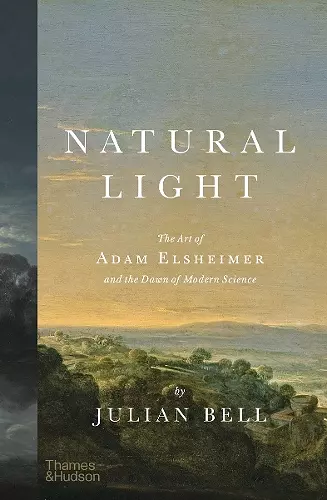Natural Light
The Art of Adam Elsheimer and the Dawn of Modern Science
Format:Hardback
Publisher:Thames & Hudson Ltd
Published:11th May '23
Should be back in stock very soon

A brand-new perspective on early modern art and its relationship with nature as reflected in this moving account of overlooked artistic genius Adam Elsheimer, by an outstanding writer and critic.
Seventeenth-century Europe swirled with conjectures and debates over what was real and what constituted 'nature', currents that would soon gather force to form modern science. Natural Light deliberates on the era’s uncertainties, as distilled in the work of painter Adam Elsheimer – a short-lived, tragic German artist who has always been something of a cult secret. Elsheimer’s diminutive, intense and mysterious narrative compositions related figures to landscape in new ways, projecting unfamiliar visions of space at a time when Caravaggio was polarizing audiences with his radical altarpieces and circles of ‘natural philosophers’ – early modern scientists – were starting to turn to the new ‘world system’ of Galileo.
Julian Bell transports us to the spirited Rome of the 1600s, where Elsheimer and other young Northern immigrants – notably his friend Peter Paul Rubens – swapped pictorial and poetic reference points. Focusing on some of Elsheimer's most haunting compositions, Bell drives at the anxieties that underlie them – a puzzling over existential questions that still have relevance today. Traditional themes for imagery are expressed with fresh urgency, most of all in Elsheimer's final painting, a vision of the night sky of unprecedented poetic power that was completed at a time of ferment in astronomy.
Circulated through prints, Elsheimer’s pictorial inventions affected imaginations as disparate as Rembrandt, Lorrain and Poussin. They even reached artists in Mughal India, whose equally impassioned miniatures expand our sense of what 'nature' might be. As we home in on artworks of microscopic finesse, the whole of the 17th-century globe and its perplexities starts to open out around us.
'Beautiful. . . . The gentle play with the size of pictures, when so much in Elsheimer depends on size, is especially touching. The book speaks eloquently to Elsheimer’s new pictorial world' - TJ Clark
'Julian Bell writes on painting as a painter himself, whose intense feel for light mirrors that of Adam Elsheimer, a German painter drawn to Italy in the age of Caravaggio and Galileo. Bell turns over Elsheimer’s little paintings like objects in amber to reveal their secrets, gently mapping intricate yet ultimately world-spanning webs of artistic allusion and scientific insight. A wunderkammer' - Jonathan Jones
'Marvellous, engrossing and illuminating … Natural Light is as light and natural as its subject warrants, a ‘mysterious journey’ on which we will encounter wondrous sights and uncover troves of treasure. It’s even funny in places' - Observer
'This is a book as rich in ideas as Elsheimer’s art. Rubens, in a eulogy to his friend, felt Elsheimer’s death to be a loss at which ‘our whole profession should clothe itself in mourning’, and this impressively scholarly and sympathetically intuitive book shows that he was not exaggerating. Bell has brought him back into the light' - Literary Review
'Engrossing... Elsheimer's works, little only in size, unlocked new possibilities for art at a time when contemporary astronomy unlocked the heavens... Mr. Bell’s incandescent prose offers a perfect verbal analogue for Elsheimer’s hushed intensity; it has a tactile, prehensile quality, as if the words had formed themselves in the writer’s mind and then taken on a life of their own before he found the time to stick them in a sentence' - The Wall Street Journal
'Bell explores the rich and significant detail, particularly botanical and astronomical, with Elsheimer’s pictures, in spite of their size, and takes us down the paths of his relationships to the art and science of his time' - RA Magazine
'This study does discerning justice to [Adam Elsheimer's] achievement. Bell’s focus is not just on Elsheimer’s registering of natural details, as the title suggests, but also on his evocation of the supernatural - never richer than in his final masterpiece, "The Flight Into Egypt", with its miraculous interfusing of homeliness and immensity' - The New Yorker
'Art historian Bell has produced a fascinating, meticulous book about a painter of whom a contemporary once said “grasped Nature’s spirit and essence”' - The Oldie
'Natural Light is nominally about the enigmatic art of the 17th-century German painter Adam Elsheimer, who was domiciled in Rome, but ranges across science, intellectual history, and the nature of Nature. Elsheimer’s tiny paintings contain multitudes and so too does this book' - Michael Prodger, Books of the Year, New Statesman
'Bell presents his thesis in an expert and accessible way, lifting the lid on a figure who has largely slipped under the radar' - Books of the Year, The Art Newspaper
'As Bell’s fine book demonstrates, this was an artist who reached for the stars' - Art Quarterly
ISBN: 9780500024072
Dimensions: unknown
Weight: 810g
256 pages